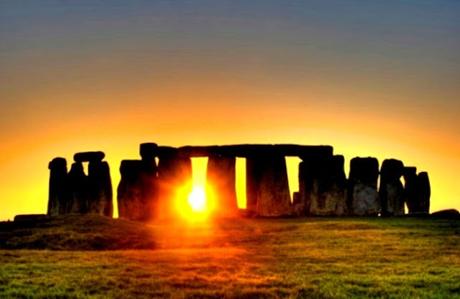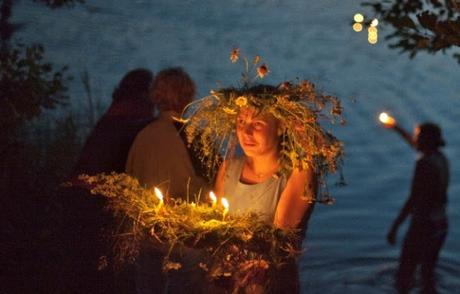Solstice derives from the Latin sol stitium, literally sun stopped (or stilled), and represents that point in the seasonal rounds when the earth's changing inclination means the sun is at an extreme (either southerly or northerly). For inhabitants of the northern hemisphere, the summer solstice, (as the inclination reaches 23 degrees north) is when we celebrate our longest day/shortest night - which this year happens to fall today, 20th June. The further north one travels, the lighter it remains for longer and there are places (for instance in Canada, Russia and Scandinavia) where the sun never dips below the horizon.
It has always been regarded as a magical event since pre-historic times. Not only was it a signal that the next phase in the agrarian cycle was commencing, it also became the catalyst for many religious celebrations to do with sun-worship, and appeasing or celebrating the gods and goddesses of fertility and the harvest. It was also thought that devils and evil spirits were particularly active. As a result lots of customs and superstitions grew up which - despite the most repressive efforts of the Christian church - still survive into the 21st century.

It has long been a custom to light bonfires on Midsummer's Night, even though it's the lightest and often the warmest time of the year. It is the practice in some places to leap over the flames of the bonfire as this is thought to bring good luck. Furthermore, folklore has it that the ash of Midsummer bonfires, if sprinkled afterwards on the farm or garden, will ensure bountiful growth for the coming year.
In some places, the summer solstice was counted as the start of a new year and in many cultures the day was celebrated with feasting, music and dancing.
More than that, the summer solstice has long been associated with fertility cults and the getting of wives or husbands. There was much collecting of herbs and wild-flowers, weaving of good-luck charms and attempts at divination. St. John's Wort (also known as chase devil) would be worn to ward off evil. Orpine (also known as live-forever and midsummer-men) when cut and planted in clay, was meant to foretell good or bad luck in bed depending on whether it leaned to left or right as it wilted! If a maiden were to walk three times round the holy place at midnight sprinkling Hempseed and then look over her left shoulder, the first man she set eyes on would be her likely husband. If a man wanted to make himself irresistible, he needed to pluck Fernweed at midnight. I suppose some of this is echoed in the love-potion plot of A Midsummer Night's Dream.
Still today, people in northern territories celebrate the solstice by lighting bonfires, holding midnight feasts, making love garlands, playing music and dancing for joy of the magic of a special event in our annual round, even if the original motivations for doing so are somewhat anachronistic or shrouded in mystery.

To celebrate this summer solstice, tonight I'm feasting on chips with egg, washed down by a few glasses of Chianti; my bonfire is a bergamot-scented candle and my music is Neil Young's newly released 'Homegrown' album. When it finishes, I'll watch the light dim and listen to garden birds proclaim the defeat of darkness.
Sun Stopped
No sousing this Midsummer's Eve
for our solstice sun, afloat defiant
upon burnished waves. Well passed
our ritual retiring time, we gaze
in wonder once again at such a sight
as heaven aglow like day with light.
Pale fires along the beach lend
pine-tinged fragrance to the breeze.
Birds choir incessant in the trees.
There must be happy magic in the air.
Hopeful lovers pluck at Fernweed,
wistful maidens scatter Hempseed.
Tomorrow all might seem a dream -
the way a sprig of Orpine leaned,
the leftward glance to one's intended;
but until this not-quite-night is ended
let's leap the flames and chase the devil
joyous in our sun stopped revels.
Thanks for reading, S
 Email ThisBlogThis!Share to TwitterShare to Facebook
Email ThisBlogThis!Share to TwitterShare to Facebook
Reactions:
